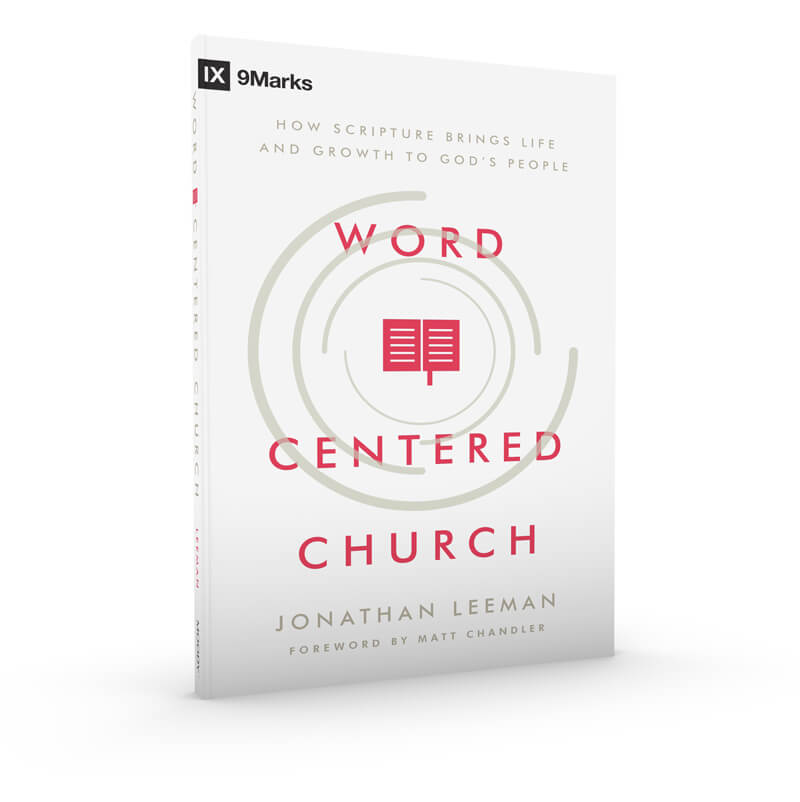Introduction
Word Centred Church by Jonathan Leeman brings a refreshing consideration to a centuries old approach of church. Many contemporary books that focus on the church, will provide a multi-step approach to improve your ministry. In Word Centred Church, Leeman does not offer such techniques, but leads the reader to the oldest and most profound strategy – placing the Word at the center of all ministries. In so doing, Leeman reignites the dying flame of Word-based churches! This review will consider the book text as a whole (synopsis), its strengths and weaknesses and will conclude with a personal reflection.
Synopsis
Word Centred Church is split into three parts: The Word, The Sermon, and The Church. Each part builds and develops the truths previously stated. In part 1, Leeman offers several explanations as to what the Word of God does. He helpfully shows that the Words found in Scripture act differently from everyday words used in society. When proclaimed, the Word directly impacts the life of the hearer. Contained within this section is a foundational consideration, that the Word and God Himself cannot be separated, therefore it is God who impacts the life of the hearer of the Word.
In part 2, consideration is given to the main arena where the Word is proclaimed – the sermon. A Word-based sermon will transform lives, not through specific techniques, but through the power found within the text heralded. Encouragement is given to preach the text, in a faithful and expositional manner. In part 3, Leeman expands to show how the Word impresses onto and within the congregation through how it sings, prays, and disciples one another.
Throughout these sections, there is a careful consideration of the Biblical text. There is a constant refrain of Scripture, highlighting that to be Word based, a church must be thoroughly well versed. Leeman concludes with a challenge – to daily read the Word and find other Christians to discuss what you have learned.
Strengths and Weaknesses
A significant strength of Word Centred Church is that it employs a Word centred approach effectively. Apart from the pages depicting relevant stories (that give a practical outworking of the Word) each page is filled with Scriptural references. Importantly, these verses are not proof texts, but are used with careful consideration of context. In considering the relevance of the Word in church ministry, the reader is not led to the opinion of the author, but rather the Word of God – it is the Word of God that declares that the church should be Word centred.
A further strength is that Leeman offers substantial application to his initial utterances of being Word centred (Part 1). The subsequent parts show how the Word shapes the sermon (Part 2) and the Church (Part 3). In doing so, we learn that the Word impacts each area of ministry and life. The reader is not simply reading facts but is in active rumination over the material given. The stories provided, the vulnerability shown, and the real scenarios explained, brought authenticity to the text.
One weakness of the text can be found in a reoccurring gender specific analogy. It can be best seen in the following quote: “Maybe the girl does need to be dressed up after all; but we need to dress her only with righteousness and love, not designer jeans.”[1] Gender specific analogies, in this case specific to woman, can alienate the reader and potentially lead to offense. A distinct misogyny is reflected in this example – the man is given the ‘control’ of dressing the ‘girl’. Further to this, it could be said that gender specific explanations can lead to a sexualization of the subject matter. In this instance, the focus is placed on how the ‘girl’ looks and what she is wearing. Considering the book focuses on being Word centred, this unhelpful explanation leads the reader away from the Word, negatively impacting the text.
Occasionally, the author makes bold statements,[2] but with limited qualification given. It would be helpful to provide further insight, however, overall, this is achieved in most cases.
Personal Reflection
Having served in several church contexts, I have been tempted on occasion to lead ministries to be more attractional. The pressure to see growth in church is real, and it becomes increasingly difficult to ‘stay the course’ of being Word focused. Considering this, I was both challenged and encouraged by Leeman. I was challenged to see that an event focused church will only lead to a shallow and short-lived growth. Whereas a Word centred approach may take longer, and require more patience, it leads to deeper commitment to Christ
I was encouraged to remember that a plain and modest handling of the Biblical text gives opportunity for God to re-reveal the truths of His Word. As a preacher, it is not required of me to ‘reinvent the wheel’ but to preach the text boldly, and courageously. The church should not gather around me, the preacher, but around the Word of God and the treasures contained within it. These truths will directly impact my sermon preparation in the future.
[1] Jonathan Leeman, Word Centred Church: How Scripture Brings Life and Growth to God’s People. Chicago: Moody Publishers, 2017, 79.
[2] Leeman states “our invisible God is known only through His Word” but gives no further insight into why it is the only way that God can be known (Leeman, 19).
